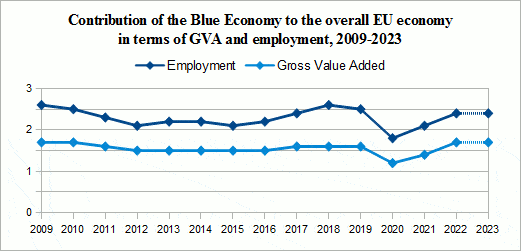
Today, the European Commission published "The EU Blue
Economy Report 2025", which presents the economic results of the
sectors of the EU's blue economy referring to the latest data
provided by Eurostat for 2022, the year in which the
sector has generally shown a recovery from the crisis of the
Covid-19 directly employing 4.82 million people,
generating almost 890 billion euros in revenues and representing
250.7 billion euros of gross value added. The document
also presents estimates for 2023, the year in which - it is announced - the
sectors of Europe's blue economy continued to grow
contributing €263 billion to gross value added
and employing 4.88 million people.
Also in 2022, coastal tourism continued to be
the main sector of the blue economy, generating 33% of the value
of the EU's blue economy and 53% of employment
sector. In 2022, strong increases were recorded both
of gross value added and employment, as well as in that of
coastal tourism, maritime transport and
Renewable. In addition, emerging sectors such as energy from
blue biotechnology and desalination create new
business opportunities and promote economic growth.
The offshore wind energy sector is one of those in
faster growth, with an increase in gross value added
by +42% compared to 2021. This increase boosted profits
of the sector, which reached 4.1 billion euros.
The document highlights that 2013 and 2022 took place
a significant increase in gross value added in all
sectors of the European blue economy. Among these, coastal tourism
remains the leading sector and in 2022 it recorded a full
recovery in terms of gross value added and turnover, after being
fell by 64% and 59% respectively in 2020 due to the
Covid-19 pandemic. In the same period, wind energy
recorded the highest growth, with +1,049%, followed by
maritime transport (+99%), construction and repair
marine biological resources (+44%) and
port activities (+36%).
The report also highlights that the EU is progressing towards
a sustainable blue economy, in line with the objectives of the Green
European Deal to improve resource efficiency, resilience
and competitiveness, while eliminating net emissions
of greenhouse gases and safeguarding natural capital. Transport
maritime sector, for example - it is specified - is on the right track,
with a 10% reduction in emissions over the period 2013-2022 for
ton of goods transported for sea freight, including
the cabotiero. In addition, the EU fishing fleet has
achieved a 31% reduction in CO2 emissions in the same
time span. The increased efficiency of the fishing fleet
is also demonstrated by a 17% reduction in the
fuel consumption in 2022 compared to 2009.
